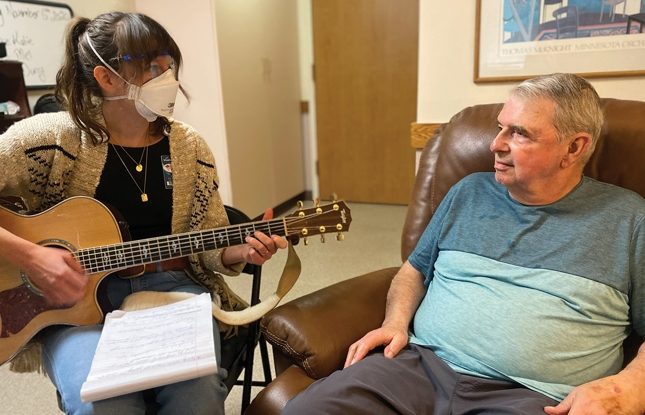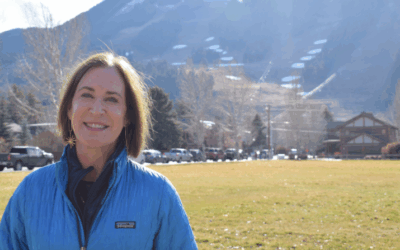Whether dealing with dementia, depression, trauma or physical disabilities, music therapy can help.
In advance of the recent Center for the Arts live stream event, “Embracing Aging: Power of Music,” St. John’s Living Center’s Music Therapist Hilary Camino and Director of Community Relations, Beth Furlong, joined us in the KHOL studio to talk about the power of music.
Listen above for more. A transcript of the interview is below.
KHOL: First off, can you explain what music therapy is? And how does it work?
CAMINO: Music therapy is used with a multitude of populations that you mentioned so eloquently earlier, and it’s the use of music to accomplish non-musical goals. So if you think about a music teacher is using music to accomplish musical goals and performers performing to be with an audience and entertain. So a music therapist, on the other hand, is using music as a tool to accomplish non musical needs. So that might be alleviating pain, decreasing anxiety. Offering a chance to connect with others, increasing non-verbal communication and so that it’s a vast area of needs that music therapy can assess and work with to alleviate, and it’s across the spectrum.
KHOL: How do the different parts of the brain react when they hear music?
CAMINO: So many different things are happening in the brain, which is what makes it so incredibly impactful. You’re accessing areas of the brain when engaging in music and when listening to music. So specifically, when you’re engaging in music or playing an instrument, you’re using your body. So that’s engaging the motor cortex, cerebellum, sensory cortex. You are using your eyes to read music or watch what you’re doing. That’s the visual cortex. You’re listening to sounds and perceiving them. That’s the auditory cortex. You’re using your critical thinking and problem solving when you’re learning an instrument or writing a song. And that’s the prefrontal cortex. You’re using both sides of the brain. it’s really amazing how many parts of the brain are impacted when you’re playing music. And that’s really what is so special about the use of music to help people is that there’s no other stimuli that has that kind of global effect on the brain.
KHOL: Hilary, you were inspired by your grandmother to get into the field of music therapy – can you tell us about that experience?
CAMINO: I went and I did my undergrad in music and I was very confused how I would use music in my life as a profession. And I studied education for a while. I performed and it was after I got my undergrad that my grandmother was actively passing. And I went and visited her and we were you know what it’s like being in a room with someone dying could be a very palpable and intense situation. And I just felt this dryness in the air. And there was a hymnal there. And so I picked up the hymnal and started singing How Great Thou Art. And the change in the room was palpable. I have chills just talking about it now. And not only did I look around and see my loved ones all of a sudden opening up and sharing and expressing and crying and, you know, being able to feel their feelings. And not only that, but I looked at my grandmother and there was a change in her. Her breathing pattern changed her. She started moving around a little bit and she had been non-verbal for four days and just seeing and feeling that connection that I had with her and the rest of the room in my family. And it was in that experience that I walked away knowing I want to do this every day. I want to provide this for people, and I want to experience that kind of closeness and expression that music can help us feel.
KHOL: How does music therapy specifically help with dementia?
CAMINO: When someone is experiencing late stage memory loss, they can lose a lot of their abilities to communicate and be together. And so I kind of stripped that away and take away those formal formalized interactions and verbal communication and just slowly base our interactions around music. And so they can feel, let’s say it’s in a group setting that they’re able to connect with their peers and with me in a way that doesn’t require them to have a conversation which can be impossible and challenging and frustrating for people with dementia. And so we use music together, and I use improvising a lot with people with dementia and have them play instruments that are accessible to them. So, um, the glockenspiel or the xylophone or drums, things like that. And so they’re able to communicate and be themselves in music and share that with each other. And we also use songs that they knew that are stored in their long term memory, which is from their childhood and their early 20s, typically not after that time. And they’re able to recall those memories because where the brain can become damaged in certain areas, music, music is still accessible at all of those other areas of the brain that we talked about. So music is still accessible to people with dementia, and it’s very much held in those long term memories. And so they feel like they’re able to access those memories that music so beautifully brings out in us.
KHOL: Can you share a story of how music therapy has helped a patient in particular?
CAMINO: I think of a gentleman who was with us and he. He worked with me for a while and I knew that music therapy could help him because he was feeling kind of a loss of who he was as an individual, which can happen often when we’re relocated into a long term care community. And so we really work toward helping him build a new skill that could renew that sense of purpose. And so at first we tried the ukulele. It wasn’t really happening, different instruments. And then one day he said something to me and I was like, oh, my gosh, you’re a songwriter. And so that’s when our journey began and we started writing songs together. And he fell in love with the process. And he would work on his songs every single day on his own and then share them with me. And we would work toward the process of therapeutic songwriting, we work through what it is that he wrote about and why. And then we put it to words or put it to lyrics, and then we put it to music and we recorded it. And he was so proud of that process in that product. And he would share it with all the nurses and all the staff and took so much pride in that process. And one thing that he said, he says, I used to build houses and now I build songs. And I just loved that experience with him and what that did for his whole sense of self and who he was as an individual.
KHOL: It must be thrilling to experience such a transformation in someone with the power of music, how have those experiences changed YOU as a person?
CAMINO: I’m daily grateful for the work that I do because I grow so much in every interaction in session that I have. My big takeaway is what we have here on Earth is the way that we can connect to one another across boundaries, across challenges with communication. And we are all humans who need to be together and connect.
FURLONG: Yeah, I’ll piggyback off of that. What I witnessed at the living center is especially towards the end of life. I mean, these people can wait years and years of life experience, family jobs, just so many experiences in their life and getting to watch it all wrap up beautifully. And Hillary’s therapy really helps that come out and helps people process, like she was saying, trauma, memories, emotion, saying goodbye to their families to witness that kind of intimacy. I mean, you know, people think what happens in a long term care community, you know, other than wheelchair, you know, you all those institutional things come up to your mind when you think of a nursing home. This is real life, what she digs into. And this is a real home and I’m just blessed to witness it.






